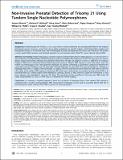| dc.contributor.author | Ghanta, Sujana | |
| dc.contributor.author | Mitchell, Michael E. | |
| dc.contributor.author | Ames, Mary | |
| dc.contributor.author | Hidestrand, Mats | |
| dc.contributor.author | Simpson, Pippa | |
| dc.contributor.author | Goetsch, Mary | |
| dc.contributor.author | Thilly, William G. | |
| dc.contributor.author | Struble, Craig A. | |
| dc.contributor.author | Tomita-Mitchell, Aoy | |
| dc.date.accessioned | 2010-12-22T19:05:16Z | |
| dc.date.available | 2010-12-22T19:05:16Z | |
| dc.date.issued | 2010-10 | |
| dc.date.submitted | 2010-05 | |
| dc.identifier.issn | 1932-6203 | |
| dc.identifier.uri | http://hdl.handle.net/1721.1/60363 | |
| dc.description.abstract | Background
Screening tests for Trisomy 21 (T21), also known as Down syndrome, are routinely performed for the majority of pregnant women. However, current tests rely on either evaluating non-specific markers, which lead to false negative and false positive results, or on invasive tests, which while highly accurate, are expensive and carry a risk of fetal loss. We outline a novel, rapid, highly sensitive, and targeted approach to non-invasively detect fetal T21 using maternal plasma DNA.
Methods and Findings
Highly heterozygous tandem Single Nucleotide Polymorphism (SNP) sequences on chromosome 21 were analyzed using High-Fidelity PCR and Cycling Temperature Capillary Electrophoresis (CTCE). This approach was used to blindly analyze plasma DNA obtained from peripheral blood from 40 high risk pregnant women, in adherence to a Medical College of Wisconsin Institutional Review Board approved protocol. Tandem SNP sequences were informative when the mother was heterozygous and a third paternal haplotype was present, permitting a quantitative comparison between the maternally inherited haplotype and the paternally inherited haplotype to infer fetal chromosomal dosage by calculating a Haplotype Ratio (HR). 27 subjects were assessable; 13 subjects were not informative due to either low DNA yield or were not informative at the tandem SNP sequences examined. All results were confirmed by a procedure (amniocentesis/CVS) or at postnatal follow-up. Twenty subjects were identified as carrying a disomy 21 fetus (with two copies of chromosome 21) and seven subjects were identified as carrying a T21 fetus. The sensitivity and the specificity of the assay was 100% when HR values lying between 3/5 and 5/3 were used as a threshold for normal subjects.
Conclusions
In summary, a targeted approach, based on calculation of Haplotype Ratios from tandem SNP sequences combined with a sensitive and quantitative DNA measurement technology can be used to accurately detect fetal T21 in maternal plasma when sufficient fetal DNA is present in maternal plasma. | en_US |
| dc.description.sponsorship | Wallace H. Coulter Foundation | en_US |
| dc.description.sponsorship | Medical College of Wisconsin. Biotechnology and Bioengineering Center (Inducement Grant Fund) | en_US |
| dc.description.sponsorship | National Science Foundation (U.S.) (PFI grant NSF#0438604) | en_US |
| dc.description.sponsorship | Medical College of Wisconsin. Dept. of Surgery | en_US |
| dc.description.sponsorship | Tandem Diagnostics (Firm) | en_US |
| dc.language.iso | en_US | |
| dc.publisher | Public Library of Science | en_US |
| dc.relation.isversionof | http://dx.doi.org/10.1371/journal.pone.0013184 | en_US |
| dc.rights | Creative Commons Attribution | en_US |
| dc.rights.uri | http://creativecommons.org/licenses/by/2.5/ | en_US |
| dc.source | PLoS | en_US |
| dc.title | Non-Invasive Prenatal Detection of Trisomy 21 Using Tandem Single Nucleotide Polymorphisms | en_US |
| dc.type | Article | en_US |
| dc.identifier.citation | Ghanta, Sujana et al. “Non-Invasive Prenatal Detection of Trisomy 21 Using Tandem Single Nucleotide Polymorphisms.” PLoS ONE 5.10 (2010): e13184. | en_US |
| dc.contributor.department | Massachusetts Institute of Technology. Department of Biological Engineering | en_US |
| dc.contributor.approver | Thilly, William G. | |
| dc.contributor.mitauthor | Thilly, William G. | |
| dc.relation.journal | PLoS ONE | en_US |
| dc.eprint.version | Final published version | en_US |
| dc.type.uri | http://purl.org/eprint/type/JournalArticle | en_US |
| eprint.status | http://purl.org/eprint/status/PeerReviewed | en_US |
| dspace.orderedauthors | Ghanta, Sujana; Mitchell, Michael E.; Ames, Mary; Hidestrand, Mats; Simpson, Pippa; Goetsch, Mary; Thilly, William G.; Struble, Craig A.; Tomita-Mitchell, Aoy | en |
| dc.identifier.orcid | https://orcid.org/0000-0003-2581-6092 | |
| mit.license | PUBLISHER_CC | en_US |
| mit.metadata.status | Complete | |
